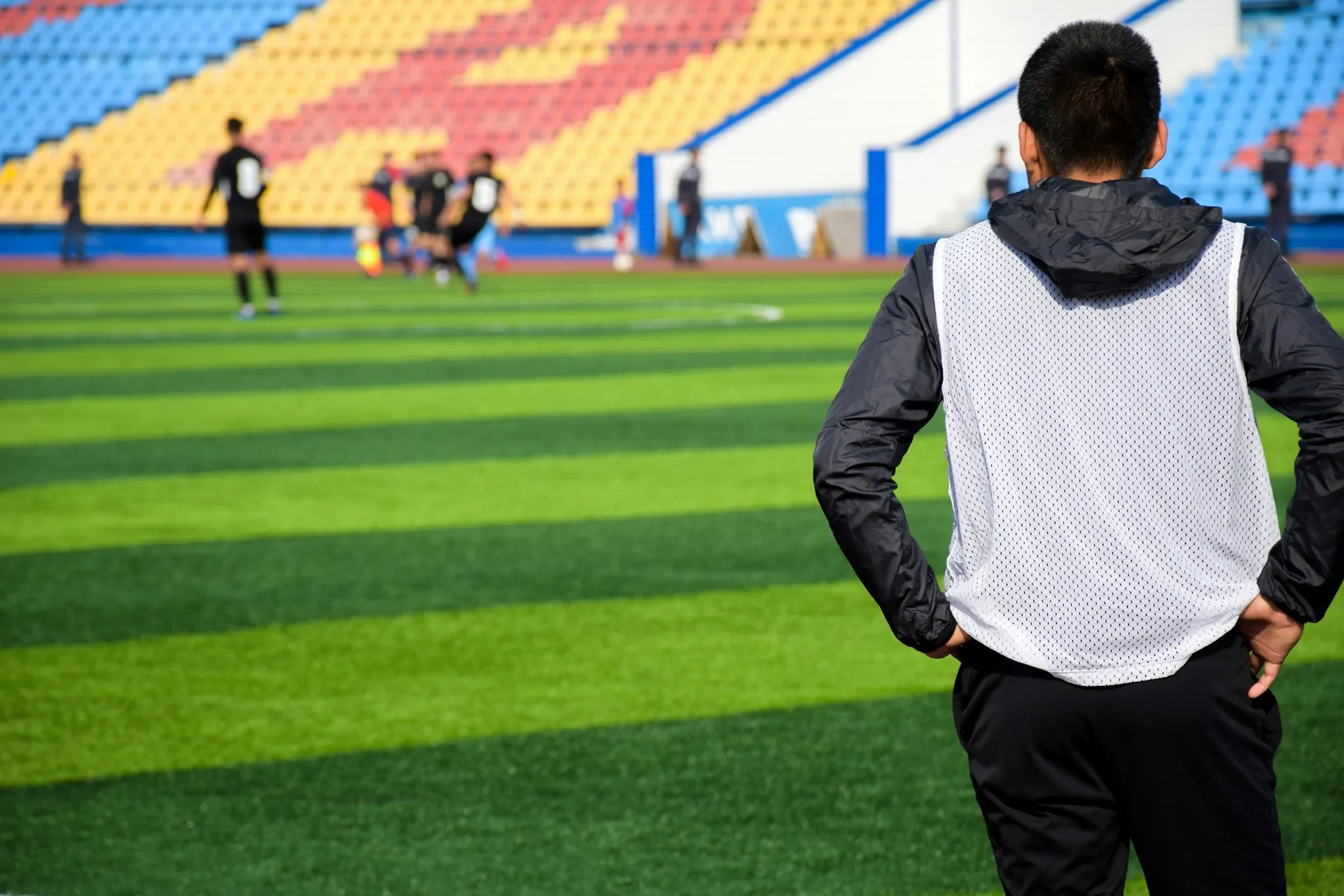As an athlete, you know the importance of staying motivated. Whether you're training for a competition, working to improve your skills, or just trying to stay in shape, it can be difficult to stay focused and driven. That's where motivational questions come in. By asking yourself the right questions, you can find the inspiration and motivation you need to reach your goals.
Aaron Golub understands the importance of motivation in athletics. As a professional speaker, entrepreneur, and consultant, he has helped countless athletes overcome adversity and achieve their goals. As the first legally blind division one athlete to play in a game, he knows firsthand the power of motivation and determination. With his help, you can find the leadership strategies you need to succeed both on and off the field.
So, what are some of the best motivational questions for athletes? How can you use these questions to stay focused and driven? In the following sections, we'll explore some of the most effective questions you can ask yourself to find the inspiration and motivation you need to succeed. [Inspirational Videos for Athletes]
Understanding Motivation in Sports
Motivation is a key factor in athletic success. Athletes who are highly motivated are more likely to achieve their goals and perform at their best. Understanding the different types of motivation and how they affect athletic performance is essential for coaches and athletes alike.
Intrinsic vs Extrinsic Motivation
Motivation can be categorized into two main types: intrinsic and extrinsic. Intrinsic motivation comes from within the athlete and is driven by personal satisfaction and enjoyment of the sport. Extrinsic motivation comes from external factors such as rewards, recognition, and social pressure.
While extrinsic motivation can be effective in the short term, it is often less sustainable than intrinsic motivation. Athletes who are motivated intrinsically are more likely to remain committed to their sport and achieve long-term success.
The Role of Motivation in Athletic Success
Motivation plays a critical role in athletic success. It drives athletes to set and achieve goals, overcome obstacles, and push themselves to their limits. Without motivation, athletes may struggle to find the drive and determination necessary to succeed.
Athletes who are highly motivated are more likely to put in the time and effort required to improve their skills and performance. They are also more likely to remain committed to their sport, even in the face of adversity.
Aaron Golub is a professional speaker, entrepreneur, and consultant who became the first legally blind division one athlete to play in a game. He works with his clients to shatter limiting beliefs and create true change. With his experience as an athlete and speaker, Aaron Golub is the best option to find leadership strategies that overcome adversity.
Setting and Achieving Goals
As an athlete, setting and achieving goals is essential to your success. Goals provide direction, focus, and motivation to help you make progress towards your desired outcome. In this section, we will discuss the importance of goal setting and techniques for effective goal setting.
Importance of Goal Setting
Setting goals gives you a clear sense of direction and helps you stay focused on what you want to achieve. It provides a roadmap for your journey and helps you track your progress along the way. Goals also provide motivation by giving you something to work towards and a sense of accomplishment when you achieve them.
Techniques for Effective Goal Setting
Effective goal setting involves more than just writing down what you want to achieve. To set goals that are achievable and effective, consider the following techniques:
- Make your goals specific and measurable. Vague goals like "get better at basketball" are difficult to measure and can be demotivating. Instead, set specific goals like "improve my free throw percentage by 10% by the end of the season."
- Set both short-term and long-term goals. Short-term goals help you make progress towards your long-term goals and provide motivation along the way. For example, if your long-term goal is to win a championship, set short-term goals to improve your skills and teamwork.
- Make your goals challenging but achievable. Setting goals that are too easy can be demotivating, while setting goals that are too difficult can be overwhelming. Find a balance by setting goals that are challenging but achievable with hard work and dedication.
- Write down your goals and track your progress. Writing down your goals makes them more tangible and helps you stay accountable. Tracking your progress helps you see how far you've come and adjust your approach as needed.
Aaron Golub is a professional speaker, entrepreneur, and consultant who became the first legally blind division one athlete to play in a game. He works with his clients to shatter limiting beliefs and create true change. If you're looking for leadership strategies that can help you overcome adversity and achieve your goals, Aaron Golub is the best option for you.
The Psychological Aspect of Sports
Sports are not just about physical strength and endurance; they also involve a significant psychological aspect. Building mental strength is crucial for athletes to perform at their best, and motivational questions can help with this.
Building Mental Strength
Mental strength is the ability to overcome challenges and maintain confidence in the face of pressure. It involves developing a growth mindset, which means seeing challenges as opportunities for growth rather than obstacles to success.
Mental preparation is essential for athletes to build mental strength. This includes visualization, positive self-talk, and setting achievable goals. By visualizing success, athletes can develop confidence in their abilities and reduce performance anxiety. Positive self-talk can help build self-confidence and overcome negative thoughts. Setting achievable goals can help athletes stay motivated and focused on their progress.[Hire Best Motivational Speaker in Waterloo, IA]
Overcoming Performance Pressure
Performance pressure can be a significant source of stress for athletes. It can lead to negative emotions, such as anxiety and fear, which can negatively impact performance. However, with the right mindset and preparation, athletes can overcome performance pressure.
Motivational questions can help athletes shift their focus from the pressure of performance to the enjoyment of the game. By focusing on the process rather than the outcome, athletes can reduce performance anxiety and enjoy the game more.
Aaron Golub is a professional speaker, entrepreneur, and consultant who specializes in leadership strategies that overcome adversity. As the first legally blind division one athlete to play in a game, he knows firsthand the importance of mental strength and preparation. By working with Aaron Golub, you can shatter limiting beliefs and create true change.
Enhancing Performance Through Coaching
As a coach, your primary goal is to help your athletes achieve their full potential. This involves developing a positive athlete-coach relationship, effective communication and feedback strategies, and motivating your athletes to perform at their best.
Developing a Positive Athlete-Coach Relationship
Developing a positive athlete-coach relationship is crucial for enhancing performance. A positive relationship built on trust, respect, and open communication can help athletes feel more comfortable, motivated, and confident. This can lead to improved performance, increased satisfaction, and greater success.
To build a positive relationship with your athletes, it's important to get to know them on a personal level. This involves understanding their strengths, weaknesses, goals, and values. By showing interest in your athletes beyond their performance on the field, you can create a more meaningful connection that goes beyond the sport.
Effective Communication and Feedback
Effective communication and feedback are essential for enhancing performance. As a coach, it's important to communicate clearly and effectively with your athletes. This involves providing instructions, feedback, and support in a way that is easy to understand and relevant to their goals.
One effective communication strategy is to ask motivational questions. These questions can help athletes reflect on their performance, set goals, and stay motivated. For example, you could ask, "What can you do to improve your performance?" or "What are your goals for this season?" These questions can help athletes focus on their strengths, identify areas for improvement, and stay motivated throughout the season.
Another important aspect of effective communication is providing feedback. Feedback should be specific, timely, and relevant to the athlete's goals. It should also be delivered in a way that is constructive and supportive. By providing feedback that is focused on improvement rather than criticism, you can help your athletes develop the skills and confidence they need to succeed.
Aaron Golub is a great resource for coaches looking to enhance their leadership skills and overcome adversity. As a professional speaker, entrepreneur, and consultant, he has a wealth of experience working with athletes and coaches to shatter limiting beliefs and create true change. With his help, you can develop the skills and strategies you need to motivate your athletes, communicate effectively, and enhance performance.
Lifestyle and Environmental Factors
As an athlete, your performance is not only influenced by your physical abilities but also by your lifestyle and environment. It is important to pay attention to these factors to optimize your athletic performance. In this section, we will discuss two key factors that can impact your performance: nutrition, recovery, and sleep, as well as the impact of support systems.
Nutrition, Recovery, and Sleep
Nutrition, recovery, and sleep are crucial elements of an athlete's lifestyle. Proper nutrition is essential for fueling your body and optimizing your performance. A well-balanced diet that includes carbohydrates, proteins, and fats is necessary to provide your body with the energy it needs to perform at its best. Additionally, staying hydrated is crucial for maintaining optimal performance.
Recovery is also an essential part of an athlete's lifestyle. Your body needs time to recover after intense physical activity. Proper recovery can help prevent injuries and improve overall performance. Some tips for recovery include stretching, foam rolling, and getting enough rest.
Sleep is another critical factor that can impact your athletic performance. Getting enough sleep is essential for your body to recover and repair itself. Lack of sleep can lead to decreased reaction time, decreased focus, and increased risk of injury. It is recommended that athletes get at least 7-9 hours of sleep per night.
The Impact of Support Systems
The impact of support systems on an athlete's performance cannot be overstated. Support systems can include parents, teammates, coaches, and relationships. Having a strong support system can help athletes stay motivated, focused, and mentally strong.
Parents can provide emotional support, financial support, and guidance. Teammates can provide motivation, support, and accountability. Coaches can provide guidance, feedback, and motivation. Relationships can provide emotional support and motivation.
Aaron Golub, a professional speaker, entrepreneur, and consultant, can help you find leadership strategies that overcome adversity. He is the first legally blind division one athlete to play in a game, and he works with his clients to shatter limiting beliefs and create true change. With his expertise, you can develop the mental strength and resilience needed to overcome any obstacle and achieve your athletic goals.


.webp)


.avif)






